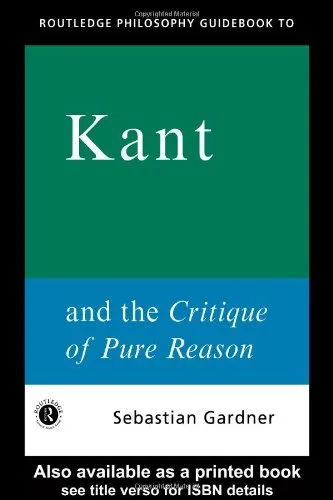Philosophy GuideBook to Kant and the Critique of Pure Reason
4.5
Reviews from our users

You Can Ask your questions from this book's AI after Login
Each download or ask from book AI costs 2 points. To earn more free points, please visit the Points Guide Page and complete some valuable actions.Introduction
Welcome to a comprehensive guide to understanding Immanuel Kant's monumental work, "Critique of Pure Reason." This guide is designed to offer a clear and accessible introduction to one of philosophy's most profound texts, paving a path through the complex theories and innovative thoughts that marked a turning point in modern philosophical inquiry. It serves not only students of philosophy but anyone interested in exploring the foundational ideas that continue to influence contemporary philosophy and beyond.
Detailed Summary of the Book
Kant's "Critique of Pure Reason" deals with the limitations and scope of human understanding and knowledge. It introduces the dichotomy between "a priori" (knowledge independent of experience) and "a posteriori" knowledge (knowledge dependent on experience), aiming to combine metaphysical inquiry with empirical evidence. Kant argues against the rationalist and empiricist traditions, proposing a new, critical approach to metaphysics. This guide endeavors to dissect Kant's intricate arguments and propositions, focusing on the core themes such as the nature of space and time, the categories of understanding, and the transcendental idealism that forms the groundwork of his philosophy.
Key Takeaways
- Transcendental Idealism: Kant's revolutionary theory that while we may perceive objects, the true nature of these objects (the "thing-in-itself") is beyond our comprehension.
- Synthetic A Priori Judgments: Kant’s identification of knowledge that can be universally true yet known without experience, bridging rationalism and empiricism.
- Space and Time: Seen not as independent realities but as the modes through which we understand phenomena.
- Categories of Understanding: The essential concepts that structure human cognition, such as causality, unity, and plurality.
- The Limits of Knowledge: Kant explores the boundaries of what we can know and posits that metaphysical speculation must be grounded in the structure of human cognition.
Famous Quotes from the Book
"Science is organized knowledge. Wisdom is organized life."
"All our knowledge begins with the senses, proceeds then to the understanding, and ends with reason. There is nothing higher than reason."
Why This Book Matters
The "Critique of Pure Reason" is a cornerstone of Western philosophy. Kant reshaped philosophy in a manner that would influence subsequent thinkers from Hegel to Heidegger, and continues to resonate in today's philosophical debates. His critical philosophy reconciled the empirical and rational traditions in a way that laid the groundwork for modern philosophical developments. The book’s exploration into cognition, perception, and reality challenges readers to consider the foundations of their understanding of the world.
This guide assists in navigating Kant’s dense prose and abstract concepts, shedding light on his intention to set metaphysics on a secure path of scientific inquiry. By doing so, it empowers readers with an understanding of the basic principles that underpin much of our philosophical and scientific reasoning today.
Ultimately, engaging with Kant’s critical philosophy allows us to confront essential questions of human existence, knowledge, and reason, making it indispensable reading for anyone seeking to comprehend the intellectual forces that shape our world.
Free Direct Download
You Can Download this book after Login
Accessing books through legal platforms and public libraries not only supports the rights of authors and publishers but also contributes to the sustainability of reading culture. Before downloading, please take a moment to consider these options.
Find this book on other platforms:
WorldCat helps you find books in libraries worldwide.
See ratings, reviews, and discussions on Goodreads.
Find and buy rare or used books on AbeBooks.
1376
بازدید4.5
امتیاز50
نظر98%
رضایتReviews:
4.5
Based on 0 users review
"کیفیت چاپ عالی بود، خیلی راضیام"
Questions & Answers
Ask questions about this book or help others by answering
No questions yet. Be the first to ask!


